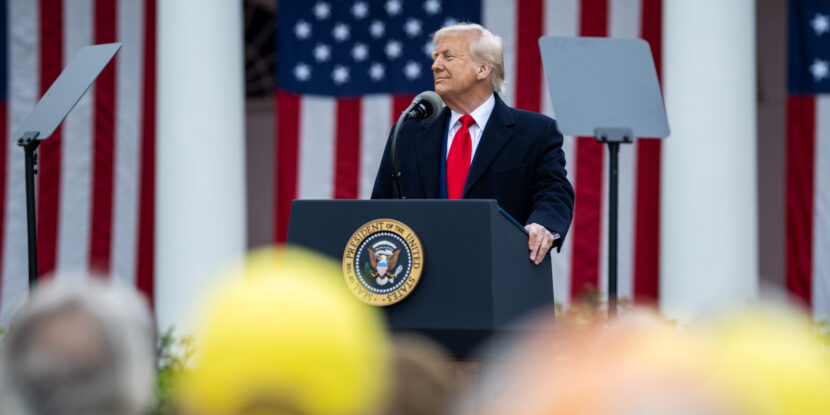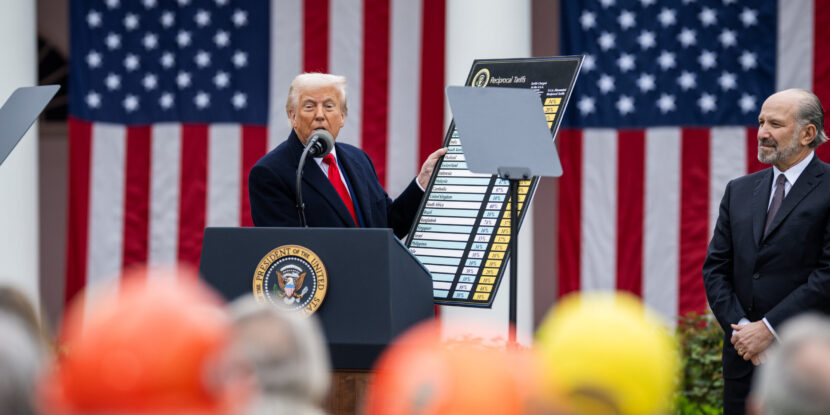
PULSE POINTS:
❓What Happened: President Donald J. Trump stated that tariffs on other nations will remain until trade deficits with China, the European Union, and others are eliminated.
👥 Who’s Involved: President Trump, his economic advisers.
Your free, daily feed from The National Pulse.
📍 Where & When: Remarks were made on Air Force One on Sunday; Trump was headed to his club in Jupiter, Florida.
💬 Key Quote: “Hundreds of billions of dollars a year we lose with China,” Trump said. “And unless we solve that problem, I’m not going to make a deal.”
⚠️ Impact: Global businesses, investors, and markets have been affected; American manufacturing will likely build strength over time with less competition from low-wage economies.
IN FULL:
On Sunday, President Donald J. Trump announced he would maintain tariffs on other nations until the United States’ trade imbalances with the likes of China and the European Union (EU) are addressed. Speaking to journalists aboard Air Force One, Trump emphasized the financial losses stemming from trade with China, stating, “Hundreds of billions of dollars a year we lose with China. And unless we solve that problem, I’m not going to make a deal.”
The America First leader’s remarks followed efforts by his senior advisers to bolster his broad-reaching tariff policy. As Trump traveled from his Mar-a-Lago property for a golfing day at his Jupiter, Florida club, key economic advisers dismissed the short-term market shock, asserting that the President’s approach to tariffs would yield benefits for American industry and workers.
Trump’s aides noted Sunday that more than 50 countries have already expressed interest in finding ways to avert U.S. tariffs. Commerce Secretary Howard Lutnick confirmed that the tariffs would indeed proceed, saying, “The tariffs are coming. Of course they are.”
Some countries have already retaliated against Trump’s tariffs, including China, which announced a 34 percent tariff on all U.S. imports last week. President Trump reacted to the retaliatory tariffs, saying, “China played it wrong, they panicked—the one thing they cannot afford to do!” He later announced China will be subjected to an increased 50 percent tariff if it does not back down.

PULSE POINTS:
❓What Happened: Officials from the Trump Administration discussed the President’s reciprocal trade plan to counter global economic policies perceived as harmful to American workers.
👥 Who’s Involved: Secretary of the Treasury Scott Bessent, Secretary of Commerce Howard Lutnick, National Economic Director Kevin Hassett, Secretary of Agriculture Brooke Rollins, Attorney General Pam Bondi, and Senior Counselor Peter Navarro.
Your free, daily feed from The National Pulse.
📍 Where & When: Various news shows aired discussions on Sunday, including Meet the Press, Face the Nation, This Week, State of the Union, Fox News Sunday, and Sunday Morning Futures.
💬 Key Quote: Scott Bessent remarked on tariffs, “A 20 percent tariff on China led to a 0.7 percent price level increase over four years. I think that’s pretty good.”
⚠️ Impact: The administration aims to reduce reliance on foreign goods and protect American industries, citing national security and economic stability concerns.
IN FULL:
Several Trump Administration officials appeared on major news programs Sunday to outline its tariff strategy, intended to change the economic landscape to favor American workers and industries and mitigate distorted trade imbalances.
Secretary of the Treasury Scott Bessent recalled the tariffs imposed during President Donald J. Trump’s first term, noting that a 20 percent tariff on Chinese goods resulted in only marginal price increases and net real wage growth for American households. He added that the COVID-10 pandemic exposed the fact that “[America’s] supply chains are not resilient,” explaining that “President Trump has decided that we cannot be at risk like that for our crucial medicines, for our semiconductors, for shipping.”
Secretary of Commerce Howard Lutnick also emphasized the national security risks involved in outsourcing critical manufacturing: “We don’t make medicine in this country anymore. We don’t make ships. We don’t have enough steel and aluminum to fight a battle,” he warned.
Kevin Hassett, National Economic Director, explained that cheap foreign imports come at a cost, recalling how, in the years since China was admitted to the World Trade Organization (WTO), “real incomes declined about $1,200 cumulatively… We got the cheap goods at the grocery store, but then we had fewer jobs.”
Peter Navarro, Senior Counselor for Trade and Manufacturing, emphasized that many of America’s so-called trade partners have adopted practices beyond tariffs “that are designed, explicitly, to cheat us”—such as currency manipulation, to strengthen their export potential, and regulatory barriers against American produce —and that President Trump has determined to draw a line against this.
“We’re headed towards a strong America that makes things again,” he added.
show less

 2 months ago
5
2 months ago
5








 English (US) ·
English (US) ·